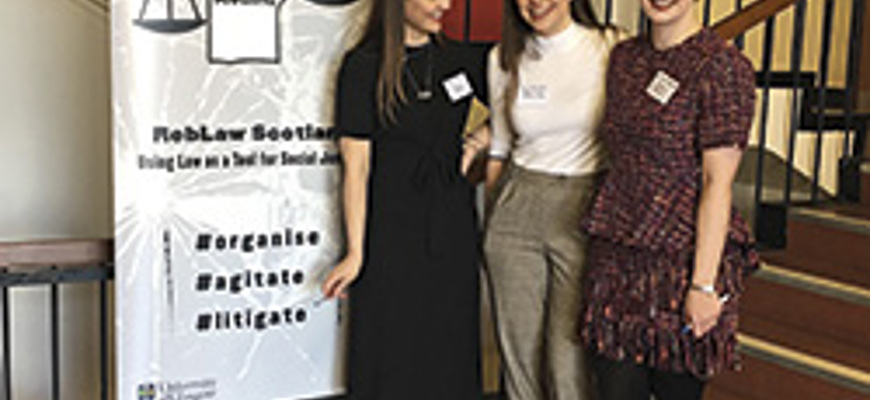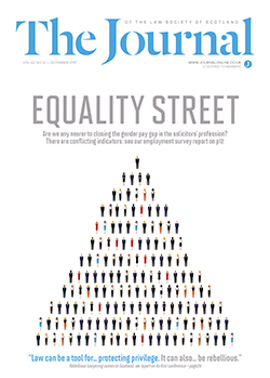RebLaw Scotland – join the rebellion

Enemies of the people. The now well-worn (but no less concerning) Daily Mail headline was used to describe Britain’s senior judiciary last year. It is hard to believe, reading it, that anyone would choose to become a lawyer – far less that lawyers may actually be vociferous supporters of social justice.
Yet the reality is that many, even most, lawyers enter the profession with a view to making a positive difference to the societies we live in. Law can be a tool for preserving the status quo and protecting privilege. It can also be an instrument of change. Law can be rebellious.
Rebellious lawyering
RebLaw is a movement founded by US lawyer and UCLA academic Gerry Lopez. A vocal campaigner for marginalised groups, Lopez has dedicated his career to “rebellious lawyering”. His 1992 book, Rebellious lawyering: one Chicano’s vision of progressive law practice, sparked a movement to empower low-income and underserved communities through grassroots, community-based advocacy facilitated by lawyers. From it came Yale Law School’s annual RebLaw conference, the largest student-run public interest conference in the US. Last year, RebLaw came to the UK for the first time, hosted by the University of Law in London.
The movement now has a home north of the border at the University of Glasgow, led by trainee solicitors Mairi McAllan, Katy Macaskill and Seonaid Stevenson.
“Like most law students, I studied law because I care about social justice,” Stevenson comments. “When I attended the RebLaw conference in London, I knew it was exactly the kind of lawyering I wanted to fling myself into, heart and soul. Mairi, Katy and I felt that lawyers, in particular law students and junior professionals, needed a place to come together to discuss how we can use our skillset to tackle pressing social justice challenges. We felt the Scottish legal community would strongly identify with and support the concept of rebellious lawyering.”
They weren’t wrong: 11 November saw more than 150 delegates descend on the University of Glasgow for Scotland’s first RebLaw conference, generously funded by the Clark Foundation for Legal Education. Nine panels throughout the day discussed issues ranging from cuts to legal aid, to combating domestic abuse, to legal responses to homelessness. There was a clear desire from attendees to engage with the rebellious lawyering concept, and the event sold out within days.
Speakers included the University’s Rector, Aamer Anwar, and representatives from Shelter Scotland, the Scottish Refugee Council, the Scottish Human Rights Commission and numerous law centres including Govan Law Centre and JustRight Scotland.
“We were genuinely overwhelmed by the response to RebLaw Scotland – and that is a testament both to Gerry’s work and the passion within the Scottish legal community itself,” says McAllan, a trainee solicitor who recently ran for election in her home constituency of Dumfriesshire, Clydesdale & Tweeddale. “We are incredibly grateful to all our panellists, volunteers and the staff at the University of Glasgow for supporting us. There was a clear desire in the room to do more, try harder and think smarter about how we can serve underserved communities. Being a lawyer is a huge privilege and we need to think about
how we can use our privilege to benefit our communities.”
Next steps
RebLaw Scotland emphasises that it is a movement, not a one-off conference, and is keen to involve as many people as possible going forward. Further events are planned for early next year, including a Rebellious Lawyers exhibition which will showcase rebel lawyers throughout Scotland’s history.
Upcoming plans also include building an online law clinic which helps to address common legal issues faced by vulnerable communities. “Volunteering at law clinics has shown us that many problems raise their head repeatedly – whether that is dealing with rogue landlords or claims for unfair dismissal, the same issues do crop up time and again,” adds Macaskill, who regularly volunteers at law clinics in Glasgow. “We want to provide plain language guides to common legal problems. Commercial law firms produce excellent factsheets on all manner of commercial legal issues; there is no reason why we can’t do the same for the problems faced by vulnerable communities.”
In short, students and trainees, under the supervision of qualified lawyers and academics, would identify common problems faced by underserved communities and then prepare factsheets, vlogs and infographics. RebLaw Scotland appreciates that nothing can replace high quality, in-person legal advice, but also recognises that with access to justice under threat, we need to look at innovative ways to reach vulnerable groups. Creating an online clinic would help those who are looking for initial advice orientate themselves in a complex legal landscape.
Get in touch
RebLaw Scotland is keen to harness the momentum built from its launch and encourages anyone and everyone interested in joining the movement to get in touch. You can follow RebLaw Scotland on twitter @RebLawSco; alternatively email seonaidmarystevenson@gmail.com to join the mailing list or learn more about becoming a RebLaw Scotland member.
In this issue
- GDPR: do you need a data protection officer?
- Prospectus to buy into
- From Milngavie to the Middle East
- Devolution after the Brexit hurly burly
- Reading for pleasure
- Opinion: Janys M Scott
- Book reviews
- Profile
- President's column
- Forward from a landmark year
- People on the move
- Equality: is it practised?
- Alcohol pricing: a measured response?
- Private tenancies: rebalancing or just upheaval?
- Spending means savings: legal aid study
- Too late, too late?
- RebLaw Scotland – join the rebellion
- Sentences: having the last word
- Insolvency and jurisdiction update: stating the obvious?
- When threats are OK
- Enter yet another tenancy
- Rights of the funded
- Registration rejections – more than formalities
- Heritage holder
- Public policy highlights
- Society's first MOOC opens legal learning to all
- Where there's a will...
- Resolution for the new year
- Q & A corner
- A year to accredit
- Dilapidations: the pitfalls
- Scaling the depths
- Equality: a matter of choice?






